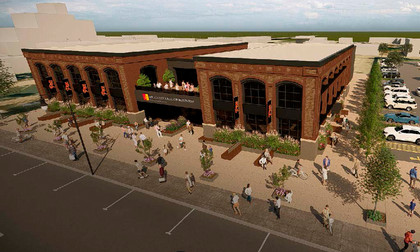Kelce College of Business Accreditation
AACSB accreditation assures that Pitt State programs in the Kelce College of Business meet the profession's quality standards for which that program prepares graduates. See why accreditation mattersAACSB Accreditation
All degree programs in the Kelce College of Business are accredited by the Association to Advance Collegiate Schools of Business (AACSB). AACSB-accredited schools have the highest-quality faculty, deliver relevant and challenging curriculum, and provide educational and career opportunities that are not found at other business schools.
Learn why AACSB accreditation matters to students.
AACSB Accreditation represents the highest standard of achievement for business schools worldwide. Less than 5% of the more than 16,000 schools worldwide granting business degrees have earned AACSB Accreditation. AACSB-accredited schools produce graduates that are highly skilled and more desirable to employers than other non-accredited schools.
Performance Data
College Enrollment by Degree Program
| Academic Term | BBA Enrollment | MBA Enrollment | MPAcc Enrollment | Total Enrollment |
|---|---|---|---|---|
| Fall 2018 | 809 | 97 | 2 | 908 |
| Fall 2019 | 741 | 263 | 4 | 1,008 |
| Fall 2020 | 679 | 360 | 5 | 1,044 |
| Fall 2021 | 647 | 364 | 4 | 1,015 |
| Fall 2022 | 622 | 293 | 9 | 924 |
Enrollment by Degree Program and Gender
|
Academic Term
|
Undergraduate Enrollment
% Male
|
Undergraduate Enrollment
% Female
|
Graduate Enrollment
% Male
|
Graduate Enrollment
% Female
|
Total Enrollment
% Male
|
Total Enrollment
% Female
|
|---|---|---|---|---|---|---|
| Fall 2018 | 63.5 | 36.5 | 57.6 | 42.4 | 62.9 | 37.1 |
| Fall 2019 | 62.8 | 37.2 | 53.2 | 46.8 | 60.2 | 39.8 |
| Fall 2020 | 62.7 | 37.3 | 54.0 | 46.0 | 59.7 | 40.3 |
| Fall 2021 | 59.4 | 40.6 | 51.4 | 48.6 | 56.5 | 43.5 |
| Fall 2022 | 60.9 | 39.1 | 52.0 | 39.1 | 58.0 | 42.0 |
College Enrollment by Degree Level and Minority Status
Minority defined as domestic African American, Hispanic, Asian, Native American, Native Hawaiian, two or more races, and undeclared. International defined as non-resident alien.
| Academic Term | Undergraduate Enrollment % Minority |
Undergraduate Enrollment % International |
Graduate Enrollment % Minority |
Graduate Enrollment % International |
Total Enrollment % Minority |
Total Enrollment % International |
|---|---|---|---|---|---|---|
| Fall 2018 | 15.8 | 4.4 | 9.1 | 18.2 | 15.1 | 5.9 |
| Fall 2019 | 18.2 | 3.1 | 12.4 | 4.1 | 16.7 | 3.4 |
| Fall 2020 | 19.3 | 2.5 | 20.3 | 2.5 | 19.6 | 2.5 |
| Fall 2021 | 17.8 | 2.5 | 19.8 | 3.0 | 18.5 | 2.7 |
| Fall 2022 | 18.3 | 3.5 | 20.9 | 3.6 | 19.1 | 3.6 |
Degrees Awarded by Program
|
Academic Year
|
BBA Degrees
|
MBA Degrees
|
MPAcc Degrees
|
Total Degrees
|
|---|---|---|---|---|
|
2018
|
263
|
37
|
-
|
300
|
|
2019*
|
239
|
42
|
1
|
282
|
|
2020
|
238
|
78
|
2
|
318
|
|
2021
|
194
|
149 | 4 |
347
|
|
2022
|
176
|
203 | 4 |
383
|
|
2023**
|
171
|
196 | 9 |
376
|
*First year MPAcc degree offered.
** Preliminary count.
BBA Four Year Retention/Graduation Rate
|
Admission Year
|
Number of Students Admitted to Kelce
|
Number of Admitted Students Graduated
|
Percent of Admitted Students Graduated
|
|---|---|---|---|
| 2012-13 | 297 | 240 | 81% |
| 2013-14 | 205 | 171 | 83% |
| 2014-15* | 139 | 127 | 91% |
| 2015-16 | 164 | 159 | 97% |
| 2016-17* | 333 | 296 | 89% |
| 2017-18 | 276 | 241 | 87% |
*Reflects significant change in Kelce College admissions standards.
Percent of Graduates Employed or Enrolled for Further Study
| Department | 2018 | 2019 | 2020 | 2021 | 2022 |
|---|---|---|---|---|---|
| BBA | |||||
| Accounting | 95 | 100 | 81 | 100 | 100 |
| Computer Information Systems | 100 | 100 | 100 | 80 | 100 |
| Business Economics | 100 | 100 | 100 | N/R | N/R |
| Finance | 88 | 94 | 100 | 91 | 100 |
| International Business | 75 | 100 | 67 | 100 | 67 |
| Management | 85 | 94 | 79 | 89 | 100 |
| Marketing | 100 | 100 | 76 | 78 | 91 |
| BBA Average | 92 | 98 | 86 | 90 | 93 |
| MBA | 96 | 95 | 96 | 97 | 92 |
| MPAcc | - | - | - | 100 | 100 |
* See details on sampling methodology and definitions.
N/R = no report; small sample
Major Field Test (MFT) Scores by Program for Graduating Students
| Year | BBA percentage at or above 50th percentile | MBA percentage at or above 50th percentile |
|---|---|---|
| Spring 2016 | 69% (n=109) | 80% (n=20) |
| Spring 2017 | 58% (n=125) | 50% (n=6) |
| Spring 2018 | 59% (n=117) | 44% (n=16) |
|
Spring 2019 |
n/r (n=0)* | 50% (n=16) |
|
Spring 2020 |
53% (n=88) | 59% (n=17) |
|
Spring 2021 |
50% (n=80) | 38% (n=8) |
|
Spring 2022 |
49% (n=88) | 47% (n=17) |
|
Spring 2023 |
45% (n=89) | 48% (n=46) |
*We were unable to administer the MFT for BBAs in 2019. n/r = no report
Program Objectives
Bachelor of Business Administration
- Communication: Graduates will show proficiency in written communication.
Sample Objective Criteria:
- Focus - The student’s purpose is clear. All parts of a writing assignment are clearly related to the main purpose. Thesis, topic sentences, and supporting statements are used effectively.
- Development – The student’s evidence and reasoning are entirely appropriate to the intended audience and purpose, and, are richly developed.
- Organization – The student’s sequence of ideas supports development of the writing assignment’s main idea; transitions and other features are used to reinforce organization.
- Style – The student’s sentences are clear, effective, and coherent; vocabulary is broad. Tone, word choice, and syntax are appropriate for the writing assignment's audience and purpose.
- Language Use and Mechanics – The student’s writing assignments are nearly free of errors of spelling, grammar, punctuation, word choice, and formatting.
- Information Technology: Graduates will be able to use current technologies to explore, analyze, and solve business problems.
Sample Objective Criteria:
- Students will analyze business data using data science tools.
- Students will conduct IT system development.
- Students will perform operations with business process management tools.
- Critical Thinking: Graduates will be able to apply theories and methods to solve problems within their respective disciplines.
Sample Objective Criteria:
- Students can translate the verbal statement of a problem into a linear programming statement.
- Students can graph lines showing feasible area with linear programming and identify the optimal solution.
- Students can interpret linear programming solution with computer output.
- Students can make evidence-based decisions.
- Teamwork: Graduates will be able to work collaboratively to produce professional deliverables.
Sample Objective Criteria (Teamwork):
- Student participates regularly and demonstrates preparedness in project activities.
- Student fulfills his/her role/duties.
- Student works cooperatively with other members of the group and volunteers willingly to help with tasks.
- Student listens to the ideas of others, considers their viewpoints and offers constructive feedback and suggestions.
- Student takes part in setting group goals and agendas.
- Student invests sufficient time and focus to work required to produce quality results.
- Student engages positively with group members.
- Student uses good problem-solving strategies to complete a task.
- Sample Objective Criteria (Professional Deliverables):
- Student is able to present the project while making effective eye contact with the audience.
- Student is able to stand up straight, and moves hands appropriately for emphasis.
- Student's physical appearance and attire are appropriately professional.
- Student uses a clear vocal tone and rhythm, so that all audience members can hear presentation.
- Student pronounces mostly everything clearly and correctly.
- Student uses visual aid showing effort. Visual aid improves overall presentation.
- Student presents information in a logical, interesting sequence which audience can easily follow.
- Student demonstrates full knowledge and can answer and elaborate on most/all questions asked.
- Student makes recommendations based upon adequate evidence, analysis, and reasonable conclusions.
- Accounting Major: Program Guide (PDF)
- Business Economics Major: Program Guide (PDF)
- Business Studies Major: Program Guide (PDF)
- Data Science and Information Systems Major: Program Guide (PDF)
- Finance Major: Program Guide (PDF)
- Management Major: Program Guide (PDF)
- Marketing Major: Program Guide (PDF)
Master of Business Administration
- Goal 1: Our graduates will be effective communicators.
- Objective 1: Our graduates will be able to demonstrate effective writing skills.
- Objective 2: Our graduates will be able to demonstrate effective oral communication skills.
- Goal 2: Our graduates will be able to analyze factors that influence the organization.
- Objective 1: Our graduates will be able to understand the role of strategic analysis in business today.
- Objective 1: Our graduates will be able to understand the role of strategic analysis in business today.
- Goal 3: Our graduates will have an understanding of effective leadership skills.
- Objective 1: Our graduates will understand how to effectively lead a team.
- Objective 1: Our graduates will understand how to effectively lead a team.
- Goal 4: Our graduates will have an understanding of the following subjects:
- Objective 1: Ethical responsibilities in organizations and society.
- Objective 2: Legal responsibilities in organizations and society.
- Objective 3: Financial theories, analysis, reporting and markets.
- Objective 4: Creation of value through the integrated production and distribution of goods, services and information.
- Objective 5: Quantitative business analysis as it supports decision-making processes.
- Objective 6: Domestic and global economic environments.
- Objective 7: Our students will have an understanding of how accounting controls may be integrated in a system of management controls.
- MBA - All Emphases: Program Guide (PDF)
- MBA - Accounting Emphasis: Program Guide (PDF)
- MBA - General Administration Emphasis: Program Guide (PDF)
- MBA - Healthcare Administration Emphasis: Program Guide (PDF)
- MBA - Human Resources Emphasis: Program Guide (PDF)
- MBA - International Business Emphasis: Program Guide (PDF)
- MBA - International Dual Degree Emphasis: Program Guide (PDF)
- MBA - Marketing Emphasis: Program Guide (PDF)
Master of Professional Accountancy
Check back soon for updates.
Rankings and Recognitions
The Princeton Review
Pittsburg State University is an outstanding business school, according to The Princeton Review. The New York-based education services company features the school in the 2024 edition of its "Best Business Schools". KCOB has recently been named to The Princeton Review Best Business Schools for 2024/On-Campus MBA Programs list.
Entrepreneur Magazine
The Gladys A. Kelce College of Business at Pittsburg State University was named one of the top business colleges in the nation by Entrepreneur Magazine, a leading publication for and about entrepreneurs. In its April issue, the magazine listed the MBA programs most highly rated by their students in six areas key to a successful career in business.
In 2018, the Accounting Degree Review ranked the Kelce College #6 in the nation for programs offering degrees with forensic accounting. Accounting majors may choose to earn a minor in Fraud Examination. This innovative interdisciplinary minor is composed of a curriculum that is patterned after the requirements for the nationally recognized Certificate in Fraud Examination. Additionally, accounting students may choose to earn a minor or certificate in internal auditing. The college is one of only 50 schools worldwide offering a curriculum sanctioned by the Institute of Internal Auditors.







